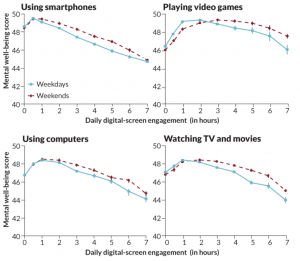
Source: https://www.inc.com/issie-lapowsky/inside-massive-tech-land-grab-teenagers.html
The advancement of technology is increasing at a dramatic rate with new technological breakthroughs every year. Nowadays, it’s quite difficult to find someone who doesn’t use technology at all. Every year, the percentage of the population using technology increases. This is shown in a study conducted by Pew Research Center in 2017 where in America, about 95% of the population owns a cellphone of some kind compared to only 35% of the population in 2011. That is about a 10% increase in cellphone ownership every year!
Also, the amount of time adolescents spend online has more than doubled from an average of 8 hr per week in 2005 to 18.9 hr per week today!
This goes to show just how dependent we are on cellphones, computers, television, etc. So, the question here, asked by all parents is: “does modern technology improve or degrade the mental well-being of the younger generation?”. Although some studies have been conducted, none have been rigorously examined.
The answer to this question was found in a study conducted by Andrew Przybylski, a psychologist at the University of Oxford and Netta Weinstein, a psychologist at Cardiff University in Wale. Andrew and Netta wanted to determine the correlation between digital-screen time and mental well-being of adolescents. They used the digital “Goldilocks” hypothesis where it describes that “too little” tech use deprives young people of important social information and peer pursuits, whereas “too much” may displace other meaningful activities.
They surveyed 120,000, 15-year-old participants across England. The survey asked the participants about their engagement in different kinds of digital activities during their free time and about their life satisfaction and happiness over the past 2 weeks.
Surprisingly, the results they found was quite the opposite to many contrary beliefs.

Figure 1. Mental well-being as a function of daily digital-screen time on weekdays and weekends. Results are shown for time spent (a) using smartphones, (b) playing video games, (c) using computers, and (d) watching TV and movies
From the figure above, the results show that moderate use of technology correlates with improved mental well-being. However, the longer the technology is used, the teens’ well-being starts to decline.
This study indicated that moderate use of technology in the modern world actually may not be so harmful and may actually be advantageous in a very online connected world that we live in today.
So, to all parents out there, there is no harm for your children to spend some time on their cellphone or laptop. And to all teens out there, although it’s nice to go on Facebook and Twitter, you should also spend some time with your family and friends out in the real world as well.
-Ziyi Wang

One response to “How Does Technology Use Correlate with Our Mental Well-Being?”